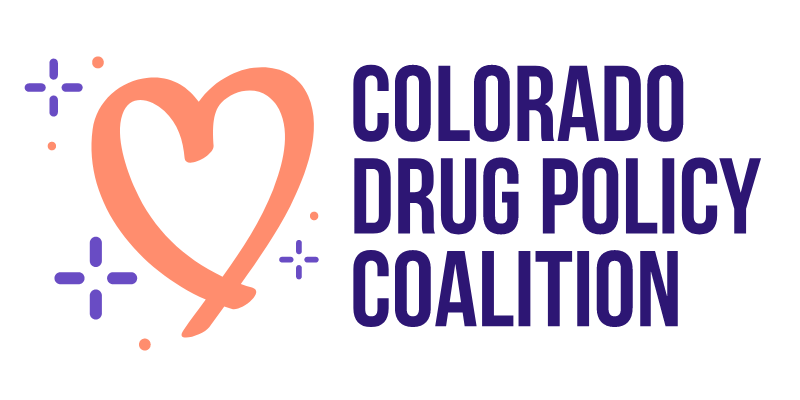
Colorado Drug Policy
In The media
-

CO Safe Consumption Site Battle Wages in Senate, as Deadline Nears
“DesWe all know SCS are coming. As the illicit drug supply becomes increasingly chaotic and we lose more and more people to overdose, Denver will eventually join New York City and the growing list of jurisdictions around the country that have either already authorized SCS or are gaining ground. It’s just a question of when, and of how much more loss we’ll endure while fearful lawmakers debate which lives are worth saving.”
— Jennifer Dillon, COPDC
-

Preventing the Next Overdose in Our Restrooms — and Our Communities
WESTWORD | MAR 19, 2023
“Our community members who use drugs need a safe option to inject that isn’t the restroom of a pizza joint. For the safety of our team members and the safety of the person injecting drugs, we ought to provide an overdose prevention center that has medical care and professionals on site, safe needles and a clean environment instead of risking a traumatic event for our team members.”
— Nicole Marquez
-

Should the U.S. Support Implementation of Overdose Prevention Centers?
COLORADO TIMES RECORDER | MAR 15, 2023
“I am not ashamed of how my son died. In fact, I am very proud of the uphill battle he fought to stay alive. What I am ashamed of is how people in our country pick and choose who has value. Every life has value and deserves the best chance of survival, and overdose prevention centers can help to achieve this for those who use drugs.”
— Laura Cash, Broken No More
-

Overdose Prevention Centers are right for Boulder
DAILY CAMERA | MAR 9, 2023
“Decades of propaganda created in our failed War on Drugs has left many folks scared, including me (at first), that allowing OPCs in our community would increase crime and drug use in the areas around the centers. However, OPCs are nothing new to the world… I get it, allowing sanctioned use of criminalized drugs in our community can be scary, but, I would argue, the current policy of criminalization and minimal support (on our terms), is even more scary and unpredictable.”
— Doug Hamilton, parent, lawyer, engineer
-

One Year Inside a Radical New Approach to America’s Overdose Crisis
NEW YORK TIMES | FEB 22, 2023
“As studies and reports going back decades have plainly stated, it’s time for politicians and health officials to treat substance abuse like the public health crisis that it is: Repeal or amend outdated laws that push too many people into jails and prisons and not enough into recovery. Invest in treatment so that those who want and need help can get it. And replace abstinence-based policies with ones grounded in reality. “
-

As opioid crisis reaches new peaks, future of overdose prevention sites in Colorado remains unclear
ROCKY MOUNTAIN PBS | MAR 9, 2023
“Part of what we are seeing in Colorado is that the policies that are in place right now are leading to tremendous amounts of overdose and death. Giving municipalities and local communities the ability to make their own decisions about whether and how they would like to look at overdose prevention sites — in order to keep people alive — that is really the root behind House Bill 1202.”
— Senadora Julie Gonzales
-

The fight on drugs cannot really be about punishing users
DENVER POST EDITORIAL | JAN 19, 2023
“If lawmakers want to “fight fentanyl” effectively and in a cost-effective way, then they should introduce legislation informed by evidence-based practices that work. This includes increased funding for harm reduction, including syringe service programs and outreach services, as well as overdose prevention sites. Yes, there is robust evidence for overdose prevention sites, places where people can bring pre-obtained drugs and be monitored so that they don’t overdose and die.”
— Joshua Barocas, Associate Professor of Medicine at the University of Colorado School of Medicine
-

Denver wanted to open safe drug-use sites four years ago. Will the legislature finally let it?
DENVER POST | FEB 10, 2023
“Authorizing overdose prevention centers gives our communities our public health officials … a really critical tool, a data-driven intervention, an evidence-based way to save lives.
It’s been saving lives for decades in other states, other countries, and it’s overdue. Long overdue.”
— Rep. Elisabeth Epps, CO-HD6
-

As drug deaths surge, one answer might be helping people get high more safely
NPR | OCT 15, 2022
“We’ve seen abstinence forced on people, and it just doesn’t work. It’s about survival. I feel like we’re helping a lot more people by keeping them alive so we can offer care. This should have happened at the start, when the overdose epidemic started.”
—Dr. Charles Breau
-

Denver wants to fight fentanyl overdoses with a supervised drug use site, but the project is still stalled 4 years inm
DENVER POST | SEP 4, 2022
“What you have now are 17-year-old baristas being traumatized. They don’t want to clean the bathrooms because they might come across someone overdosing,” Raville said. “I just don’t know how many thousands of people have to die from a preventable overdose before they let us try something different. It’s going to happen.”
— Lisa Raille, Exec. Dir. Harm Reduction Action Center
-

Preventing overdose requires awareness — and action
COLORADO NEWSLINE | AUG 31, 2022
“When it’s easier for people to find themselves in jail for drug use than it is to get into treatment, you know we’re on the wrong track.”
— Lisa Raville, Exec. Dir. Harm Reduction Action Center
-

What NY Drug Injection Sites Mean For Denver Substance Treatment
LANDMARK RECOVERY | AUG 16, 2022
“We’ll definitely get [an overdose prevention center] in Denver. I just don’t know how many more thousands of people have to die of preventable overdoses until they let us try something different.”
— Lisa Raville, Exec. Dir. Harm Reduction Action Center
-

State Laws Are Treating Fentanyl Like the New Crack—And Making the Same Mistakes of the 80s and 90s
TIME | MAY 12, 2022
“The evidence is just so clear that criminalization and felonization and incarceration will not do anything to decrease rates of substance use disorder or even recreational drug use, and it certainly won’t decrease rates of overdose deaths,” says [Colorado Coalition for the Homeless’ Dr. Sarah] Axelrath. “But we have things that work. And so it is frustrating to watch our resources be funneled into interventions that we know from 50 years of both research and practice aren’t effective.”
-

Doctors know harsher criminal penalties won’t decrease drug abuse
DENVER POST | ARP 27, 2022
"The repercussions of getting this wrong could not be more serious: flooding our overburdened treatment centers, straining law enforcement resources, overtaxing our judicial system, increasing drug-related transmissible conditions (like HIV, hepatitis C, and others), and even more overdose deaths.
We agree with Colorado legislators that our loved ones, friends, and neighbors need help. But we believe what they need most is data-backed, evidence-based treatment and harm reduction services – not arrest and incarceration."
- Dr Bryon Adinoff
-

The Deadly Toll of America's Opioid Crisis
STATISTA | JUN 26, 2020
“The number of drug-related deaths per million people aged 15-64 is much higher [in the U.S.] than in any other country in the world. With a rate of 314.5 deaths per million and an estimated total of 67,367 drug-related deaths in 2018, the U.S. lost more lives to the use of drugs than the next 20 countries combined.”
Further Reading:
Using Evidence to Inform Legislation Aimed at Curbing Fentanyl Deaths. Journal of the American Medical Association, 2022
“There is little to no evidence that harsher criminal penalties and more punitive policies effectively reduce overdose deaths. In fact, the only evidence that does exist demonstrates that such policies are detrimental to individuals who use drugs. If the goal truly is to reduce overdose deaths, lawmakers should arm themselves with this knowledge and focus their limited time and taxpayer dollars on legislation that supports evidence-based interventions that work and not on punitive interventions that do not.”
More Imprisonment Does Not Reduce State Drug Problems: Data show no relationship between prison terms and drug misuse. Pew Charitable Trusts, 2018
“The findings… reinforce a large body of prior research that cast doubt on the theory that stiffer prison terms deter drug misuse, distribution and other drug-law violations. The evidence strongly suggests that policymakers should pursue alternative strategies that research shows work better and cost less.”
The Overwhelming Evidence in Favor of Harm Reduction. Open Society Foundations, 2018
“The evidence for harm reduction services is overwhelming. They keep people alive, are cost-effective, and foster healthier, safer communities. It is shameful that these facts are ignored by many. Until prejudice and fear stop ruling when it comes to drug policy, our health will continue to be undermined.”
